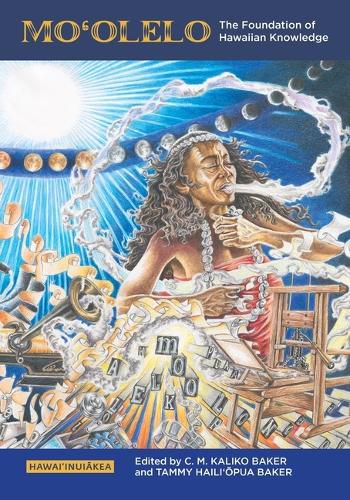Readings Newsletter
Become a Readings Member to make your shopping experience even easier.
Sign in or sign up for free!
You’re not far away from qualifying for FREE standard shipping within Australia
You’ve qualified for FREE standard shipping within Australia
The cart is loading…






An essential contribution to contemporary Kanaka Maoli (Native Hawaiian) scholarship, Mo'olelo: The Foundation of Hawaiian Knowledge elevates our understanding of the importance of language and narrative to cultural revitalization. Mo'olelo preserve the words, phrases, sentences, idioms, proverbs, and poetry that define Kanaka Maoli. Encompassing narratives, literature, histories, and traditions, mo'olelo are intimately entwined with cultural identity, reciprocal relationships, and the valuing of place, collectively informing and enriching all Hawaiian life. The contributors, all Kanaka Maoli scholars, artists, and advocates from across the Pae ‘Aina o Hawai'i (Hawaiian archipelago), all fluent in 'Olelo Hawai'i (Hawaiian language), describe how mo'olelo constantly inform their linguistic, literary, translation, rhetorical, and performance practices, as well as their political and cultural work. Chapters in 'Olelo Hawai'i alternate with chapters in English, with translanguaging appearing when needed.
Kamalani Johnson honors Larry Kauanoe Kimura’s commitment to the revitalization of 'Olelo Hawai'i. Cover artist 'Ahukini Kupihea tells the story of his own creative process and uncovers the layers of meaning behind his artwork. Through careful analysis of nineteenth-century texts, R. Keawe Lopes, Jr., demonstrates the importance of mo'olelo and mele (song/poetic expression) preservation. Hiapo Perriera explores the profound relationship between mo'olelo and the resurgence of kaka'olelo (oratory). Kekuhi Keali'ikanaka'oleoHaililani shares a methodology and praxis for engaging with mo'olelo. Highlighting the ideology of aloha 'aina embedded in mele, Kahikina de Silva reveals themes of political resistance found in mele about food. Kaipulaumakaniolono Baker examines mele that archive key movements in Hawai'i’s history and employs contemporary practices to document current events. Tammy Haili'opua Baker delineates the political implications of drawing on mo'olelo heritage in Kanaka Maoli theatre. ku'ualoha ho'omanawanui focuses upon mo'olelo found in the politically conscious artwork of Kanaka Maoli wahine (women) visual artists. Kamaoli Kuwada evaluates the difficulties and benefits of translation and stresses the importance of fluency. C. M. Kaliko Baker further demonstrates how fluency and comprehension of mo'olelo make it possible to retrieve essential empirical data on Hawaiian linguistic practice. Kalehua Krug takes us on his journey of learning to become a kakau moli (traditional tattoo artist). The essays together provide rich perspectives for Kanaka Maoli seeking to understand their pasts, to define who they are today, and to set their courses for desired and necessary futures.
$9.00 standard shipping within Australia
FREE standard shipping within Australia for orders over $100.00
Express & International shipping calculated at checkout
An essential contribution to contemporary Kanaka Maoli (Native Hawaiian) scholarship, Mo'olelo: The Foundation of Hawaiian Knowledge elevates our understanding of the importance of language and narrative to cultural revitalization. Mo'olelo preserve the words, phrases, sentences, idioms, proverbs, and poetry that define Kanaka Maoli. Encompassing narratives, literature, histories, and traditions, mo'olelo are intimately entwined with cultural identity, reciprocal relationships, and the valuing of place, collectively informing and enriching all Hawaiian life. The contributors, all Kanaka Maoli scholars, artists, and advocates from across the Pae ‘Aina o Hawai'i (Hawaiian archipelago), all fluent in 'Olelo Hawai'i (Hawaiian language), describe how mo'olelo constantly inform their linguistic, literary, translation, rhetorical, and performance practices, as well as their political and cultural work. Chapters in 'Olelo Hawai'i alternate with chapters in English, with translanguaging appearing when needed.
Kamalani Johnson honors Larry Kauanoe Kimura’s commitment to the revitalization of 'Olelo Hawai'i. Cover artist 'Ahukini Kupihea tells the story of his own creative process and uncovers the layers of meaning behind his artwork. Through careful analysis of nineteenth-century texts, R. Keawe Lopes, Jr., demonstrates the importance of mo'olelo and mele (song/poetic expression) preservation. Hiapo Perriera explores the profound relationship between mo'olelo and the resurgence of kaka'olelo (oratory). Kekuhi Keali'ikanaka'oleoHaililani shares a methodology and praxis for engaging with mo'olelo. Highlighting the ideology of aloha 'aina embedded in mele, Kahikina de Silva reveals themes of political resistance found in mele about food. Kaipulaumakaniolono Baker examines mele that archive key movements in Hawai'i’s history and employs contemporary practices to document current events. Tammy Haili'opua Baker delineates the political implications of drawing on mo'olelo heritage in Kanaka Maoli theatre. ku'ualoha ho'omanawanui focuses upon mo'olelo found in the politically conscious artwork of Kanaka Maoli wahine (women) visual artists. Kamaoli Kuwada evaluates the difficulties and benefits of translation and stresses the importance of fluency. C. M. Kaliko Baker further demonstrates how fluency and comprehension of mo'olelo make it possible to retrieve essential empirical data on Hawaiian linguistic practice. Kalehua Krug takes us on his journey of learning to become a kakau moli (traditional tattoo artist). The essays together provide rich perspectives for Kanaka Maoli seeking to understand their pasts, to define who they are today, and to set their courses for desired and necessary futures.